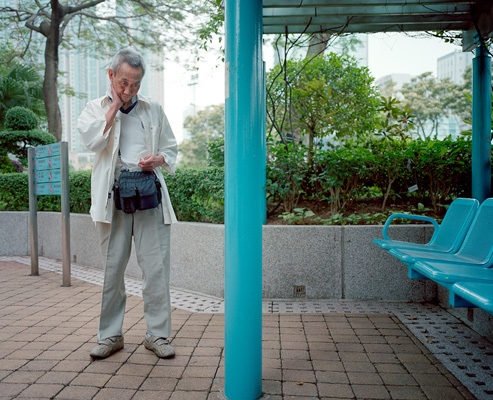
Sparse living Ng Yin-chow
Ng Yin-chow’s place is simple and compact. While Yin-chow has all the furniture he needs, the room is bare of any other personal items. He has lived here for seven years, but it seems like he could leave at any time.
Such simplicity probably comes from habit. Before Yin-chow moved into this place, he stayed in Castle Peak Hospital and intermittently in a halfway house for former mental patients. The year his mother died, he moved into this public housing unit in Hoi Lai Estate. The only decoration in the flat is a large black-and-white portrait of his mother, on the wall beside his bed. His mother was the person he respected and loved most.
Yin-chow is the eldest son. He has two sisters and a brother. But resentment is all he feels for two of his siblings. He was forced to drop out of school in Primary 2 to earn a living for the family by selling snacks in the streets. Every day, when Yin-chow returned home from work, his father would hit him with a bamboo stick.
Later, he found a job, but all the money he earned was spent on tuition fees for his siblings. However, when he was struggling to cope in later years, none of his siblings lent him a hand. “They didn't even inform me when they got married or when they had children,” Yin-chow says, sighing. “Forget it. They consider you family only when they can get a benefit from you. It’s OK. I don’t care.”
After moving into Hoi Lai Estate, Yin-chow has been relying on his monthly social welfare benefits to get by. In fact, his biggest wish is to get a job. However, as he has to take a day off to receive his injections every month, there would be no way to hide his sickness. That has frustrated him.
“A lot of people discriminate against people with mental illness,” Yin-chow says. He has repeatedly urged his doctor to let him take oral medication instead of having to return for regular injections. “He said, ‘You are already in your 60s, why bother getting a job?’” Yin-chow says. All he can do is accept that, he says reluctantly.
Every morning, Yin-chow sleeps until he wakes up naturally. Then he goes for a walk in the park or hangs out in the streets alone. He has become accustomed to living alone. He says he is not afraid of death or boredom. He occasionally dreams about his mother walking in the park with him.
“Your mum took very good care of you, right?” I ask. He folds his arms and sways slightly. His gaze seems to lose focus. After a long while, he replies softly, “Umm.”
Ng Yin-chow’s place is simple and compact. While Yin-chow has all the furniture he needs, the room is bare of any other personal items. He has lived here for seven years, but it seems like he could leave at any time.
Such simplicity probably comes from habit. Before Yin-chow moved into this place, he stayed in Castle Peak Hospital and intermittently in a halfway house for former mental patients. The year his mother died, he moved into this public housing unit in Hoi Lai Estate. The only decoration in the flat is a large black-and-white portrait of his mother, on the wall beside his bed. His mother was the person he respected and loved most.
Yin-chow is the eldest son. He has two sisters and a brother. But resentment is all he feels for two of his siblings. He was forced to drop out of school in Primary 2 to earn a living for the family by selling snacks in the streets. Every day, when Yin-chow returned home from work, his father would hit him with a bamboo stick.
Later, he found a job, but all the money he earned was spent on tuition fees for his siblings. However, when he was struggling to cope in later years, none of his siblings lent him a hand. “They didn't even inform me when they got married or when they had children,” Yin-chow says, sighing. “Forget it. They consider you family only when they can get a benefit from you. It’s OK. I don’t care.”
After moving into Hoi Lai Estate, Yin-chow has been relying on his monthly social welfare benefits to get by. In fact, his biggest wish is to get a job. However, as he has to take a day off to receive his injections every month, there would be no way to hide his sickness. That has frustrated him.
“A lot of people discriminate against people with mental illness,” Yin-chow says. He has repeatedly urged his doctor to let him take oral medication instead of having to return for regular injections. “He said, ‘You are already in your 60s, why bother getting a job?’” Yin-chow says. All he can do is accept that, he says reluctantly.
Every morning, Yin-chow sleeps until he wakes up naturally. Then he goes for a walk in the park or hangs out in the streets alone. He has become accustomed to living alone. He says he is not afraid of death or boredom. He occasionally dreams about his mother walking in the park with him.
“Your mum took very good care of you, right?” I ask. He folds his arms and sways slightly. His gaze seems to lose focus. After a long while, he replies softly, “Umm.”
許炳滿 走不盡的癌路
我第一次與炳滿見面,是在醫院病房,他快到六十歲,跟我說,他剛打贏了心臟病……說得就像他常常打仗一樣。「2003年1月16日晚上7時,忽然心律不正休克去急症室,經兩次電殛搶救。再生的我,每次面對死亡威脅,每次心跳過速,就靜下來,按住心房要自己的心跳慢下來,再去想一些未完成的事,不可以這樣就死掉,我要活下去……就這樣過了九年,換了兩次起搏器。」沒想到,舌癌、淋巴癌卻又摸上門。
因為怕自己表達不清楚,炳滿給筆者寫了一封信箋,上面寫道:「2008年2月,醫生診斷要立刻動手術,否則只剩數月……」醫生幾乎拔光了他的牙齒,手術刀割下了炳滿的舌頭,再割下一塊大腿肉補上。此後,一個人的完整表達能力就這樣永遠失去了。此後幾年間,他一直在學走路,學說話,適應沒有嘴嚼的餐單。
一大群癌細胞在他口腔裡,準備了結他的一生。他曾遊說自己早日上路。他說他遇上一個生命中的天使,一個遊走病房和劏房之間的女社工。信箋上,他寫了好幾遍:「我要活下去,表演。」
談及年輕時代,他總說,過去的不想再提起。無意間,我知道他在七十年代曾經富有,後來想必經歷了很大的震撼和動盪,中年後,曾經當過臨時工。炳滿娓娓道來未見對人生的埋怨。
炳滿喜歡看樹。「看花,看人,也很好看。你留意看,人有好多種。以前不會這麼觀察,好好玩。有些人,看一會,就知道,他這段時間,很ok,很神氣。有些人,就不是了。」炳滿還喜歡走路,他說他還有一個願望,就是走遍整個香港。
炳滿以前開過很多名車,走路很少看人,看樹。現在走路也喘氣,要坐下來休息,所以才有機會停下來看人看樹。我問他是當下是開心還是不開心?他沒有考慮便說,當然是前者。一年後,我想了又想,最記得還他不斷重複那幾句「我要活下去」。
返回相片
我第一次與炳滿見面,是在醫院病房,他快到六十歲,跟我說,他剛打贏了心臟病……說得就像他常常打仗一樣。「2003年1月16日晚上7時,忽然心律不正休克去急症室,經兩次電殛搶救。再生的我,每次面對死亡威脅,每次心跳過速,就靜下來,按住心房要自己的心跳慢下來,再去想一些未完成的事,不可以這樣就死掉,我要活下去……就這樣過了九年,換了兩次起搏器。」沒想到,舌癌、淋巴癌卻又摸上門。
因為怕自己表達不清楚,炳滿給筆者寫了一封信箋,上面寫道:「2008年2月,醫生診斷要立刻動手術,否則只剩數月……」醫生幾乎拔光了他的牙齒,手術刀割下了炳滿的舌頭,再割下一塊大腿肉補上。此後,一個人的完整表達能力就這樣永遠失去了。此後幾年間,他一直在學走路,學說話,適應沒有嘴嚼的餐單。
一大群癌細胞在他口腔裡,準備了結他的一生。他曾遊說自己早日上路。他說他遇上一個生命中的天使,一個遊走病房和劏房之間的女社工。信箋上,他寫了好幾遍:「我要活下去,表演。」
談及年輕時代,他總說,過去的不想再提起。無意間,我知道他在七十年代曾經富有,後來想必經歷了很大的震撼和動盪,中年後,曾經當過臨時工。炳滿娓娓道來未見對人生的埋怨。
炳滿喜歡看樹。「看花,看人,也很好看。你留意看,人有好多種。以前不會這麼觀察,好好玩。有些人,看一會,就知道,他這段時間,很ok,很神氣。有些人,就不是了。」炳滿還喜歡走路,他說他還有一個願望,就是走遍整個香港。
炳滿以前開過很多名車,走路很少看人,看樹。現在走路也喘氣,要坐下來休息,所以才有機會停下來看人看樹。我問他是當下是開心還是不開心?他沒有考慮便說,當然是前者。一年後,我想了又想,最記得還他不斷重複那幾句「我要活下去」。